Key takeaways:
- The risk of executing innocent individuals raises significant moral concerns about the death penalty.
- Arguments against the death penalty include its ineffectiveness as a deterrent and the financial burden it places on society.
- Personal narratives from those affected by the death penalty foster empathy and highlight the urgency for reform.
- Encouraging others to take action involves igniting empathy and creating a sense of urgency around the issue.
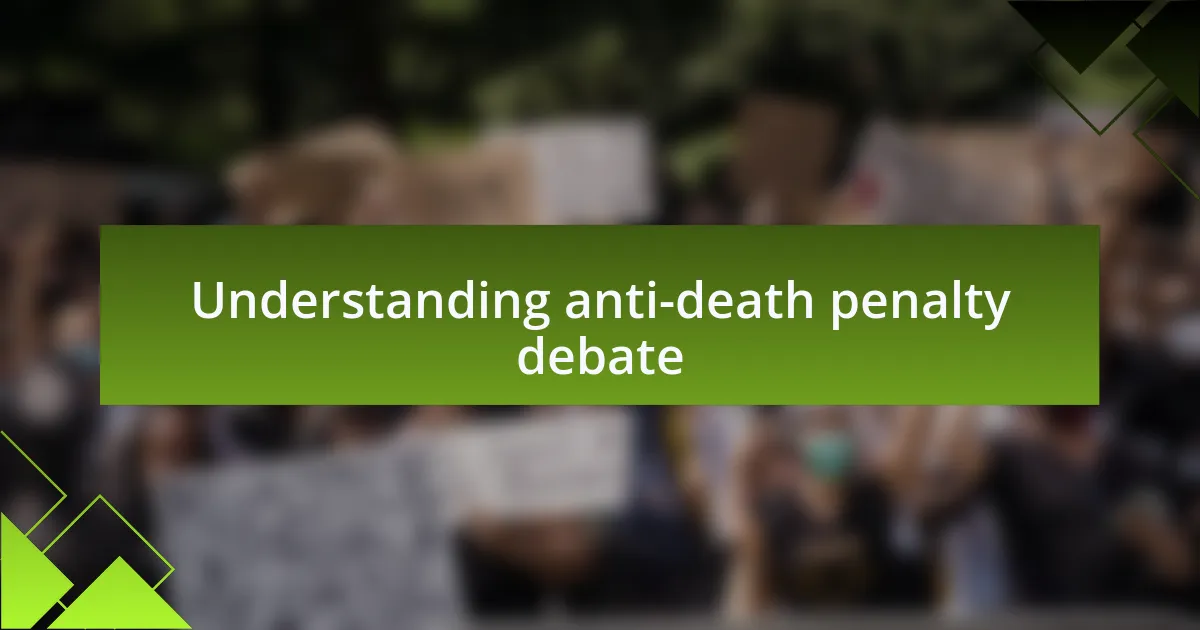
Understanding anti-death penalty debate
The anti-death penalty debate is charged with deep moral and ethical questions. I remember the first time I seriously considered the implications of capital punishment; it struck me that the possibility of executing an innocent person loomed over this practice like a dark cloud. How can we justify a system that risks irreversible error?
As I’ve delved into the statistics surrounding wrongful convictions, I found it chilling to learn that organizations like the Innocence Project have helped exonerate over 300 individuals—many of whom were on death row. Each of these stories is not just a number; it’s a life disrupted, with families torn apart. Isn’t it alarming to think that our desire for justice could lead to such profound mistakes?
Moreover, the emotional weight of the debate cannot be overlooked. When I listen to families of murder victims who oppose the death penalty, I hear their pain and longing for closure that the execution of a perpetrator cannot provide. Their voices remind us that the quest for justice is complex. How do we balance the need for accountability with the desire for a humane society?
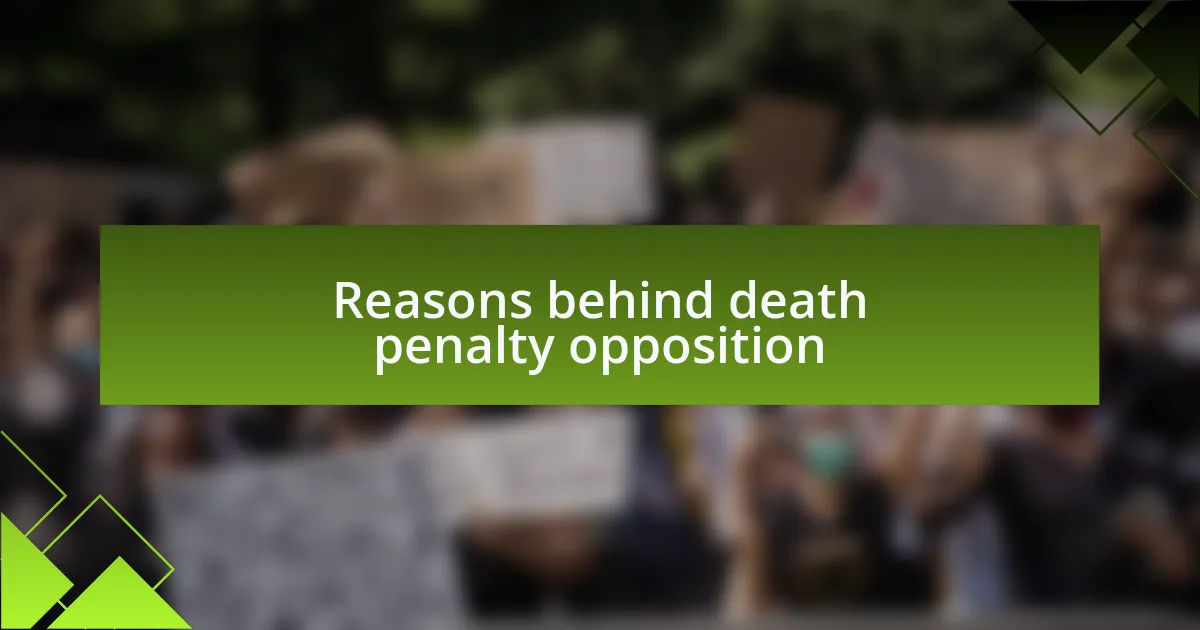
Reasons behind death penalty opposition
One major reason many oppose the death penalty is the moral quandary it creates. I once attended a gathering where a passionate speaker shared their experience of advocating for a friend wrongfully sentenced to death. It struck me that while we seek justice for victims, we might also be condemning the innocent. How can we align our pursuit of justice with the undeniable risk of executing the wrong person?
Another compelling argument against capital punishment is its ineffectiveness as a deterrent. In conversations with law enforcement professionals, I’ve heard them boldly assert that the threat of execution hardly influences criminal behavior. It made me wonder: if the death penalty doesn’t prevent crime, what purpose does it truly serve? The realization that it’s often more about retribution than justice can be disheartening.
Additionally, the cost of maintaining the death penalty is staggering. I remember reading about a case in California, where a single execution cost taxpayers millions, while a life sentence could save resources. Isn’t it ironic that the very system designed to uphold justice is also a significant financial burden on society? It’s a thought-provoking perspective that deserves consideration as we examine the broader implications of capital punishment.
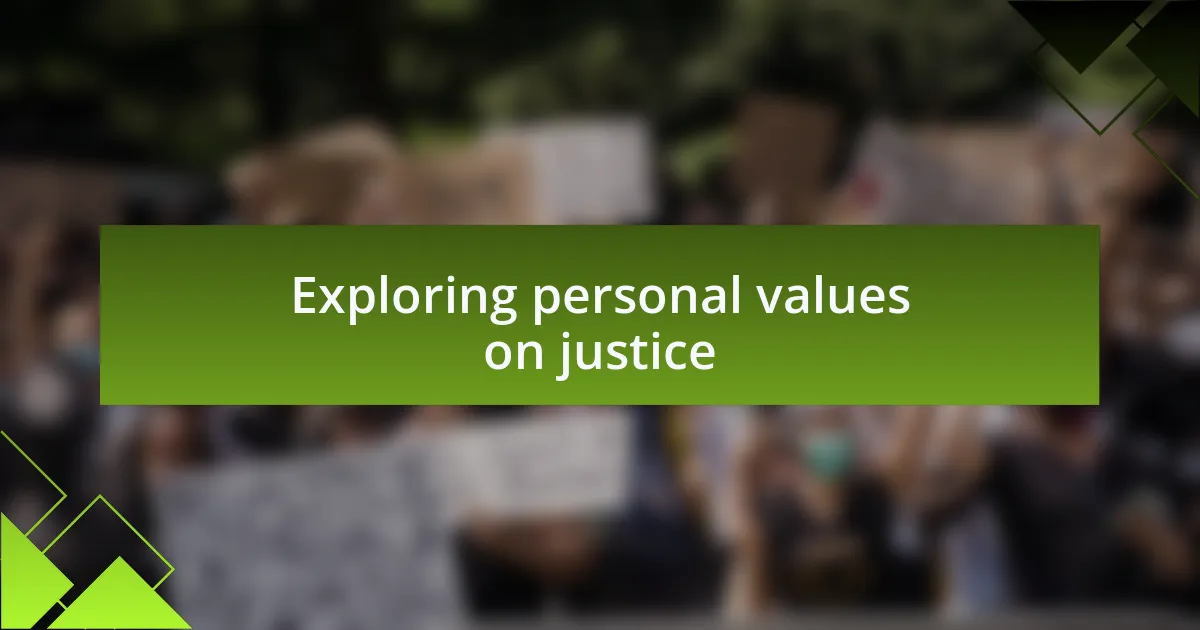
Exploring personal values on justice
When I reflect on my own values related to justice, I often grapple with the idea of fairness. There was a time when I met a young man who had devoted his life to public service, only to face unjust treatment by the legal system. His story reminded me that justice should not only be about punishment but also about understanding and rectifying systemic flaws that harm individuals.
I feel a deep connection to the notion that justice should promote healing rather than perpetuate cycles of violence. In a local community program I attended, we discussed real-life cases of relationships torn apart by harsh sentencing. It dawned on me that forgiving and rehabilitating offenders can lead to stronger communities. If justice is meant to elevate society, shouldn’t we focus on rebuilding rather than simply breaking individuals?
Exploring my values has led me to question the very definition of justice. I recall reading about restorative justice principles, where the focus shifts from punishment to dialogue between victims and offenders. This perspective was transformative for me. Isn’t it time we consider how our responses to crime shape the fabric of our communities? Engaging in such conversations has encouraged me to imagine a system where everyone has an opportunity for redemption and growth.
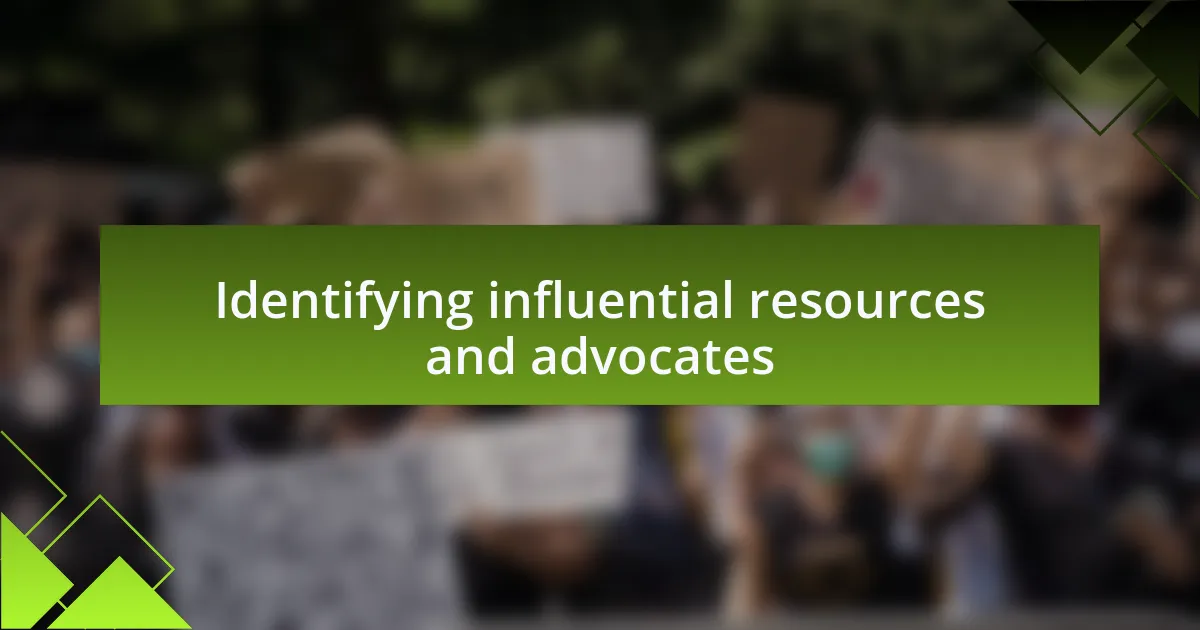
Identifying influential resources and advocates
Identifying influential resources and advocates has been a turning point in my journey. I remember scrolling through countless articles and social media posts, searching for voices that resonated with a vision of justice that transcended traditional perspectives. When I stumbled upon the works of well-known advocates like Bryan Stevenson, I felt an electric connection. His passionate arguments against the death penalty illuminated the systemic issues that fueled my own curiosity.
Finding credible books and documentaries, such as “Just Mercy,” opened my eyes to personal stories that humanized those affected by the death penalty. I can recall feeling a mix of anger and empathy as I absorbed these narratives. They reminded me that each statistic represents a life and a story, challenging me to engage more deeply with advocacy. How can we remain passive when each detail holds the power to change lives?
Engaging with local organizations has also been invaluable. I attended a workshop led by a former inmate who shared his transformative experience with harsh sentencing. His story struck a chord with me, highlighting how champions of change come from diverse paths. I often wonder, how many others are out there with stories that could ignite our passion for justice? By connecting with advocates who share their journeys, we cultivate our own drive to create meaningful change.
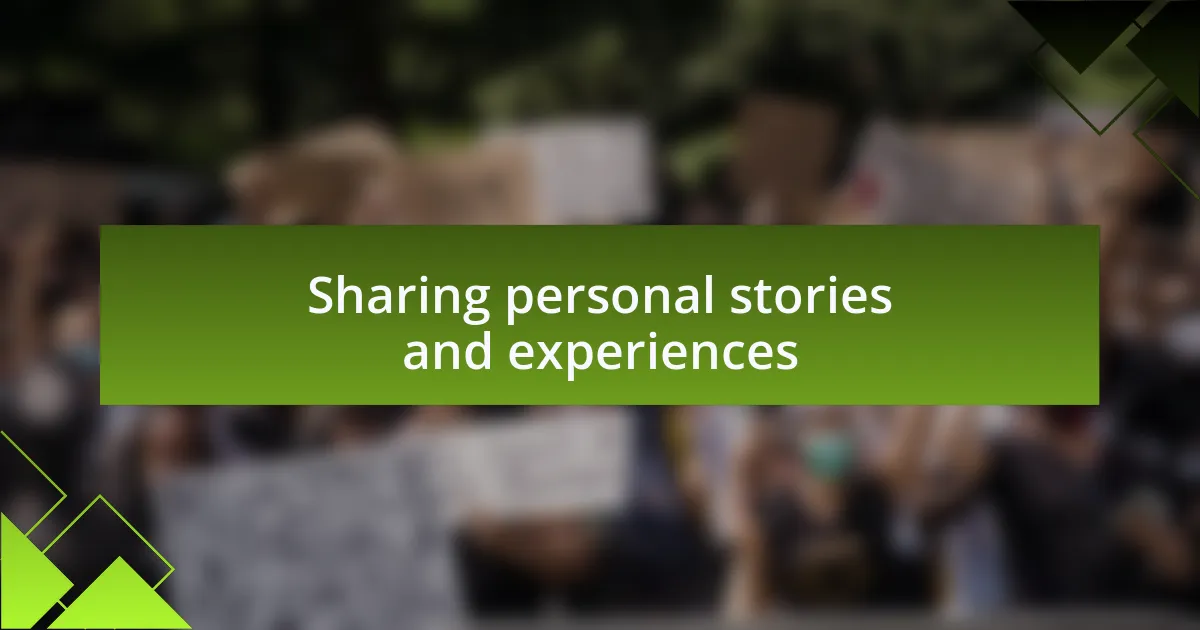
Sharing personal stories and experiences
There’s something incredibly powerful about hearing stories straight from those who have experienced the repercussions of the death penalty. I recall a particular evening spent at a community event, where a woman shared her brother’s story. He’d been wrongfully convicted, and his time in prison shaped her entire family. Listening to her recount the impact on their lives was heart-wrenching; it left me questioning how our justice system could allow such tragedies.
Each personal narrative I encounter feels like a ripple in the water; one story can spread awareness and provoke thought. I remember reading a blog from a mother who lost her son to capital punishment. Her grief was palpable, and it was her vivid descriptions that drove home the urgency of our advocacy. How could I sit idle after feeling her pain? Those intimate insights allow us to bridge the gap between abstract concepts and real human suffering, reinforcing the need for change.
Sharing experiences goes beyond mere testimonials; it creates a collective momentum. I often think about a group discussion I had with fellow advocates who shared their connections to the issue, each with unique stories that wove a larger tapestry of injustice. It made me realize that we are not alone; every shared story adds to a chorus calling for reform. How many more stories are waiting to be told, each holding the potential to inspire action?
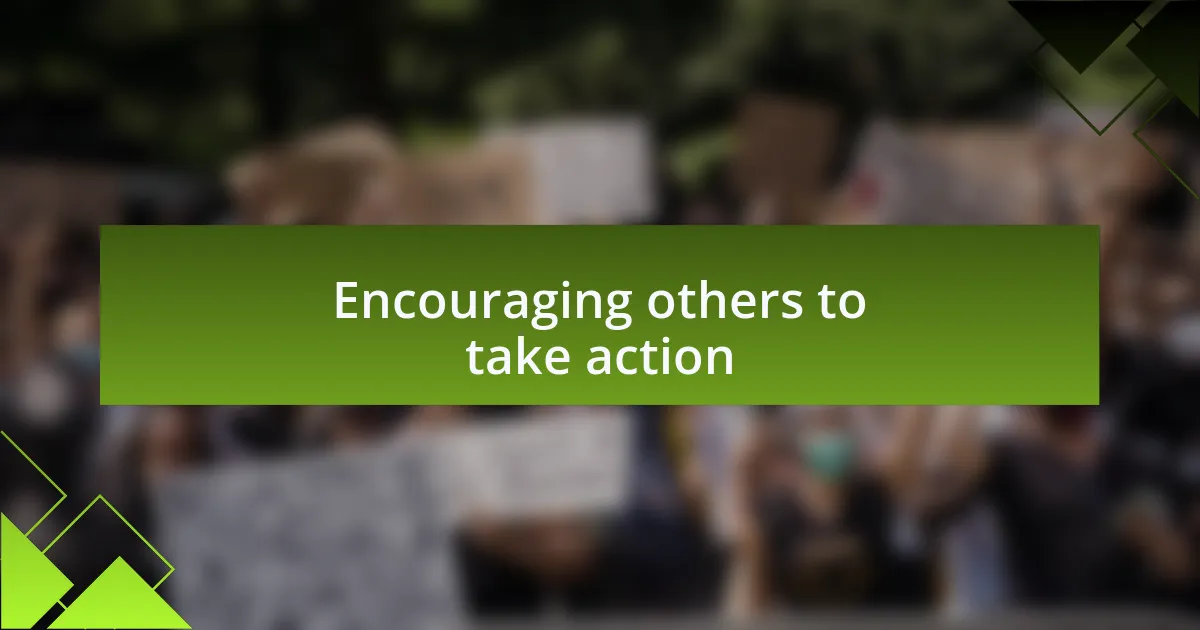
Encouraging others to take action
Engaging others in the fight against the death penalty often requires igniting their sense of empathy. I remember a moment at a local gathering where a friend, who we all know as a staunch supporter of justice, recounted how he learned about wrongful convictions. His face radiated a mix of anger and sorrow, and his passionate plea for action stirred something deep within everyone present. How could we ignore the injustice that could easily touch our loved ones?
Encouraging action is all about creating a sense of urgency. I once held a workshop where we brainstormed ways to communicate the importance of this issue. One participant shared how she had never thought deeply about the death penalty until she saw a documentary that ripped through her assumptions. The conversations that day ignited sparks of determination; what if each of us became the voice that challenges indifference?
I find that a personal touch can be the key to motivating change. During a coffee chat with a colleague, I revealed my initial hesitations about engaging in advocacy. His response was both insightful and inspiring, urging me to consider how our silence can tacitly support the status quo. It made me reflect: if I hadn’t chosen to step out of my comfort zone, how many opportunities to influence others might I have missed? The slightest encouragement can lead to a cascade of action, amplifying our collective voice for change.